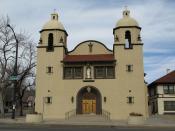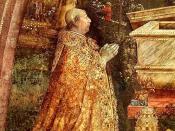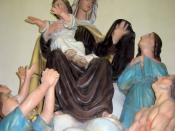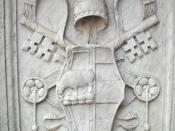In the 15th century, most people followed the Church and those who didn't were considered to be heathens and therefore would go straight to hell, where Catholics believed there were boiling oceans, scorching winds, and where they would face eternal damnation from demons. However, although the Church was believed to be a sacred, and healthy institution, this was far from the truth.
The Catholic Church was often abused by those who's job it was to maintain the faith. Many supposed churchmen openly committed the "deadly sins". Although the churchmen, who were exempt from ordinary people's laws, the fact that they openly abused the church did sometimes affect the lives of some laymen. It would later mean, that many people who had noticed these abuses would be keener to join an alternative that still believed in the same views, hence Luther's ideas becoming widespread later on. However on the other hand, most of the time, laymen were blissfully unaware of malpractice and many clergy set a good example to the community.
Most people in the 15th century were uneducated. By reading the Bible and listening to the sermons given by the priest, they were able to discover more about the world outside England. Sermons were usually given in the church, therefore once again, offering the ordinary person a place of worship and a place for them to become more educated on world via the Vulgate. However, many priests were illiterate, which meant that they were unable to read the Bible to the community.
As well as its flaws, the church also had many things good about it. The church was often in the centre of the village and was the only place big enough to house everyone in that particular vicinity. It bought people together for festivals and harvests, and Christmas. Therefore, it did offer a healthy and valuable institution for the ordinary person.
One could argue that the Catholic Church took advantage of the fear of the ordinary person, and greed resulted. People in the 15th century were terrified of hell. They believed that once they died, they would go to Purgatory, which was like a waiting room to heaven. Time spent in Purgatory could range from hundreds to thousands of years. The church would sell people indulgences that they believed would give them "time off" in Purgatory. Indulgences were little letters, and would often cost quite a lot of money, as much as a weeks wages. However many believed in was worth it if it meant they would go to heaven sooner. Nevertheless, indulgences were one of many of the churches schemes that were invented for financial interests rather than spiritual concerns.
Absenteeism was a big problem in the church in the 15th century. A practise known as simony often took place, which was the buying or selling of an ecclesiastical benefice. Many priests and churchmen took advantage of this and many churchmen held more that one post in the church, which then led to absenteeism. As it was impossible for one person to be in two places at any given time, those held more than one position in the church were often absent from another church. Therefore, if there weren't anyone to perform services in the community for the ordinary people, the ordinary people would be missing out, and would suffer in the long term. Absenteeism meant that a service that many people relied on was often unavailable.
The church facilitated very well for the laymen. It was used for baptisms, holy communions, confessions, funerals, sermons and giving people advice. It also helped strengthen the community. By offering these services to the ordinary people, it could be argued that it was a healthy institution.
There were many ways that the Church was abused, and these included the idea that many of the popes abused their position and were involved with the church in order to boost their family name. One pope, notorious for malpractice in the Church was Rodrigo Borgia, whose reign as Alexander VI from 1492-1503 was the most shameful of all. The Borgias were guilty of murder, sexual license and were generally cynical politicians who were more interested in furthering their family fortunes rather than upholding the faith.
Many people were generally unaware of malpractice in the church, and were more preoccupied with the idea that although the church may have had its problems, unless they followed the religion they would go to hell.
Although the church was often abused, it did play a vital role in ordinary communities by providing them with a place they could get advice and also gave them the general services that they believed they needed in order to get into heaven once they died. The Church offered many laymen a sense of security and gave many people a meaning of life, and helped form communities by bringing believers together. Although the church had many faults, at the end of the day, it still provided people with an institution that they could go to in time of need





